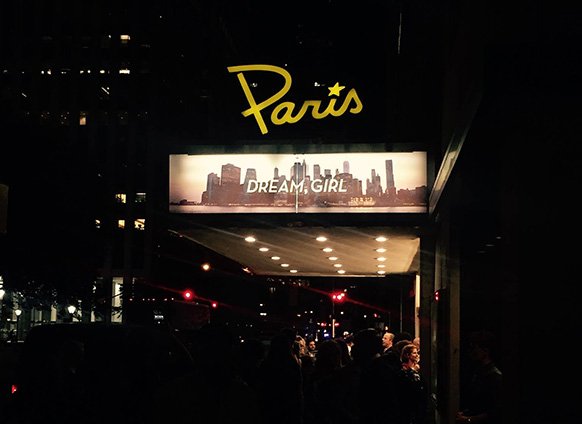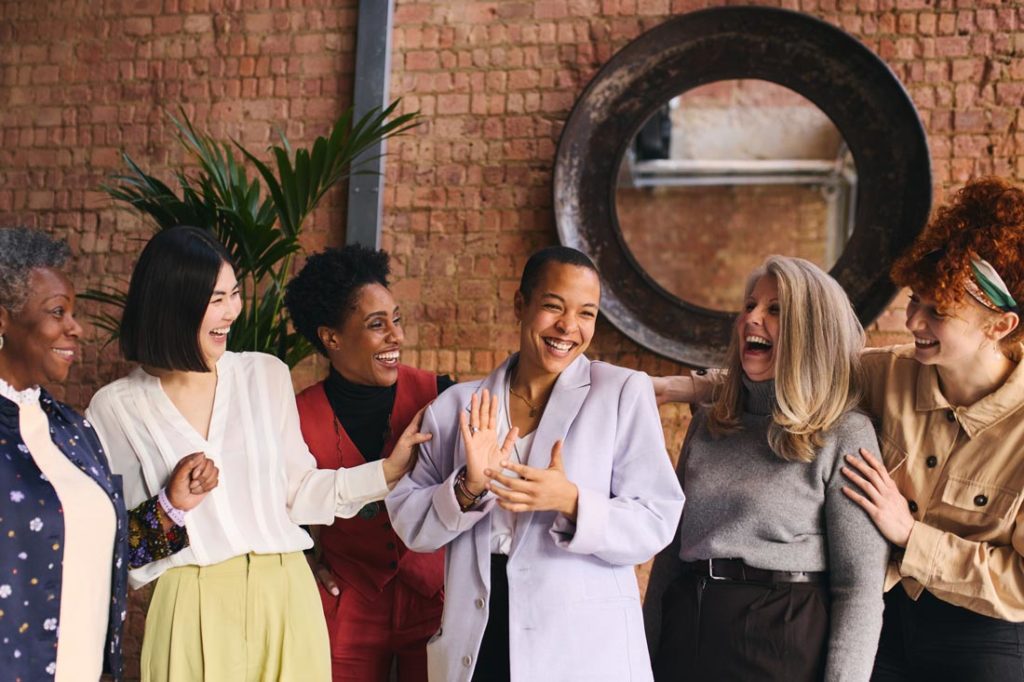It’s a Thursday morning in New York City. I arrived from Florida on Monday and saw Hamilton Tuesday at the Richard Rodgers Theatre. To say this is a dream come true is like saying people in New York City have style—gross understatements.
But today, June 9, 2016, I’m here to cover a documentary film premiere showcasing stories of female entrepreneurs at The Paris Theater near Central Park. They’ve chosen to tell these particular stories because, according to the website, “We know the names of Bill Gates, Steve Jobs and Mark Zuckerberg. But what about the female entrepreneurs? What’s their story?”
The film is Dream, Girl.
Feeling stuck? Maybe others are underrating you.
Right now I’m bustling around my hotel room. The top of the Empire State Building is visible outside my window, as if a sign of what’s to come. I’m unpacking and repacking my purse. And because New York City feels like a place where you should be doing multiple things at once, I’m also streaming a Facebook Live interview with Leslie Odom Jr.—the now Tony Award-winning actor who played Aaron Burr in Hamilton and who released a (wonderful) jazz album. I refer to Odom Jr. as “The Quote Machine” because in every interview I watch or read, he says a line or two or 10 that stops me in my tracks, makes me think, gives me courage, helps me breathe. Today he tops himself. After being asked a question that makes him consider the feeling of working under your potential, or feeling underrated, he said:
“Everybody’s underrated until you’re not.”
With six words he presents what, to me, in this moment, feels revolutionary. Maybe when you feel stuck—those moments when you’re not getting ahead, not getting the opportunities you feel you’re ready for or feel you’re working under your potential—it doesn’t always mean there’s something wrong with you.
What if, when your hunger feels greater than your opportunities, it isn’t a sign you’re doing something wrong. What if, instead, it’s a sign that you’re being underrated, ignored?
Steve Martin is known for giving the advice that you should “be so good they can’t ignore you.” It’s motivated me throughout my career to do very necessary work to learn, grow and get better. But there’s always been something in the inverse of the concept that has haunted and gutted me at times:
Does it also mean being ignored is a sign you aren’t any good?
Totally hypothetically, say you write an article, post a link to it on Twitter and the tweet gets zero likes. Does that mean you’re not a good writer? (I’m asking for a friend.)
Empowerment for ‘Dream, Girl Day.’
For the rest of what I’m calling Dream, Girl Day I decide to let only Odom Jr.’s words exist: “Everybody’s underrated until you’re not.”
What if, when we think we’re not good enough, we’re really just underrated?
I hold the thought close and continue getting ready for the premiere.
I finish packing my purse, walk the 15 minutes to The Paris Theater and find a spot in the huge line of beautifully dressed people in front of the long, bright red carpet.

DREAM, GIRL
Inside, popcorn bags are waiting for us, which embarrassingly thrills me. I try to resist grabbing two and choose an aisle seat in the third row of the 600-person theater.
Not too long afterward the theater is full, save two seats near the front.
Then film producer, director and editor Erin Bagwell and producer Komal Minhas walk in and the crowd erupts in applause and a standing ovation. Bagwell and Minhas laugh. I can tell they don’t even know what to do with this moment.
Dream, Girl makes women feel seen.
“Ever since I was a little girl I wanted to make a movie,” the film begins. In an instant I am no longer in a theater in New York City. I am Bagwell and Minhas. I am Annie, Mariama, Clara, Joanne, Marie, Alicia, Linda, Suzanne, Crista, Jess and Amanda. All the women in the film. I am them. They are me.
That is the power of film.
These women featured in the film are working hard for the simple privilege of being able to work in a way that allows them to share the best of themselves with other people. They are vulnerable. They are successful. And they don’t apologize for either.
Being these women for an hour and a half awoke something in me that I didn’t know was quiet. In getting to be them, I became more me.
Showcasing the power of women at work.
And what I loved most about the Dream, Girl was something I would have never guessed: a simple choice Bagwell made. She filmed these women at work, doing their job.
A teacher in a film course I took once said that while many scenes in movies and sitcoms will take place “at” work, they’ll rarely show characters really “doing” the daily grind of work. After all, work is usually pretty “boring to watch.”
But in this film, watching each woman in her daily grind is the most remarkably unboring thing about the film.
You see 83-year-old Clara Villarosa working on her third business, the publishing company Villarosa Media. She’s at a table with her daughters discussing which cover will sing from the shelves for one of their books.
Then there’s Annie Wang of Senvol. You see her talking to her partner about whether or not they should take on an unpleasant client because of the money it will bring in or say no, thank you.
And then there’s Minhas, founder and CEO of Karseva, Skyping one of her first employees.
Any woman who has ever tried to do more than what is expected of her will see herself in these moments. In the daily decisions necessary to move an idea forward. And in what it looks like to put yourself and your ideas on the line, each and every day.
Dream, Girl empowers women to create space.
Watching these women at work was as empowering as watching Hamilton.
Both pieces of art confirm something for me:
When you dream a dream and don’t see anyone “like you” in that space, it is not an indicator that you do not belong or that you do not have what it takes. All it is an indicator of is that that space needs you that much more. It means you are probably a trailblazer. It also means there are things you’ll have to go through that are unfair, that will be really hard. But, in the end, it means that when you fight through them you will create space for other people. Space that wouldn’t exist without you striving toward the places you “don’t belong.”
Dream, Girl reminds me of something that I sometimes have a hard time holding on to: Where there is a lack of role models, a lack of representation, a lack of diversity, it is not due to a lack of talent or ability. Instead, it is a symptom indicating the sickness that occurs when an entire group of people have been severely underrated. That’s when we all lose.
Dream, Girl shows the strength of vulnerability.
Dream, Girl not only showcases a diversity of entrepreneurs, though. It also emphasizes the diversity of character and personality traits that can make up a successful entrepreneur. Vulnerability, for example, is lauded in the film as an entrepreneurial strength, instead of a weakness.
And the women in the film are nothing if not vulnerable. Not only in their work, but also with the stories they share. The kind of stories I typically only hear in quiet conversations among a handful of trusted friends. The stories I rarely hear blown up on a giant screen in an audience of 600 people.
They talk about personal sexual harassment experiences in the workplace. The kinds of things you feel in your stomach or in the heat of your face, but often hide because you don’t want to sound like you’re making excuses. The things that, deep down, you’re still not even sure are real; if you’re allowed to feel violated or if you’re just being “sensitive,” not “tough enough.” If maybe this discomfort means you aren’t cut out for this.
I can almost feel the collective release of tension when we hear these stories. It’s as if the silent stories in the theater are rising up into the air at the same moment, reveling in the confounding elation that comes when someone tells you that that violated feeling is real, and wrong. That it’s OK to speak it out loud, even on a big screen.
Feeling ignored at work? You’re not alone.
They also talk about the deep pangs of being ignored. Those moments when you feel invisible but can’t prove it. The times when you feel so deeply unimportant in a room, even though you’ve worked really hard to be there. The moments when you feel small and wonder if maybe you really are. They talk about the moments where eyes won’t meet yours in a way that screams “you don’t belong here.”
As the women in Dream, Girl speak about these moments in their lives, I remember the ones in my own. I want to cry with joy as I realize that the worst part of feeling ignored is never actually being ignored. The worst part is feeling like the invisibility and its scars are all in your head.
Wang talks about how when some businesspeople come up to her and her male co-founder at events and ask a technical question, they always look to him to answer. When she answers, because she is the more technical one in the partnership, they still look to him, waiting for his response as the final say, the “real” expert. She talks about the small details, too, how they don’t even turn toward her when she speaks. They continue to face him. The angles of bodies that communicate worth, things you often feel in your stomach before you ever catch them with your eyes.
These stories and so many more make me feel less alone. Less crazy. Like more is possible. Like we can be all of the things, even the things that the people who angle away from us can’t see in us—yet.
Kicking open closed doors.
The film’s first step in helping viewers move forward into their full potential? Acknowledging that the closed doors are real. And that not all the doors that slam in your face are slamming because you’re not good enough.
Mariama Camara (of Mariama Fashion Production and There is No Limit Foundation, among other companies) best sums up the heart and soul of what the film does for those who see it. When she says this, the entire theater erupts in the kind of applause that makes me think for a moment that I’m back at the Richard Rodgers:
“It’s like a door… you knock and if it doesn’t open? You break it!”
Where to watch Dream, Girl online for free.
Want to watch Dream, Girl? You can stream it for free today right here!
This article was published in June 2016 and has been updated. Photo by Southworks/Shutterstock










